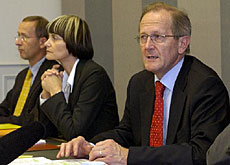Swiss ponder question of Turkish entry into EU

Commentators in Switzerland are divided about the effect of Turkey's possible entry into the European Union, following a recommendation to start talks with Ankara.
A senior Swiss diplomat said Bern’s policy on Europe would not be affected, but on Thursday many newspapers begged to differ.
State Secretary Franz von Däniken made his comments in Brussels after the European Commission recommended the start of accession talks with Ankara.
The EU cautioned, however, that talks could be suspended if Turkey backtracked on human rights or other reforms.
“It is quite simply too premature to speak now about the repercussions of Turkish membership on the future of Switzerland’s European policy,” said von Däniken.
“We have our own agenda. I think a lot depends on the application of the new bilateral accords. Only then will we know what the next steps will be,” he added.
Switzerland agreed to a second set of bilateral accords with Brussels in May after two years of tough negotiations.
The Swiss government, which offically applied to join the EU in 1992, has ruled out negotiations on full membership in the near future, but it has pledged to review the situation before 2008.
Swiss position
The “Tages-Anzeiger” newspaper reported on Thursday that the prospect of Turkey joining the EU should not leave Switzerland cold.
“An eventual entry would mean that all the bilateral agreements, including the free movement of people, Schengen etc, would have to be extended to Turkey.”
“Switzerland would also logically be affected by anticipated EU reforms,” it said.
The “Basler Zeitung” also focused on the direct consequences for Switzerland.
“Under the bilateral accords, Switzerland would participate in the internal market widened by Turkey.”
“Individual accords would have to be modified, particularly the one concerning the freedom of movement of people. This is already subject to adaptation because the EU has accepted ten new members,” wrote the paper.
In a wider context, the Geneva newspaper “Le Temps” commented that if Turkey joined the EU, Europe would have Iraq and Syria for neighbours.
“Will Europe be able to take on a Muslim dimension and abandon the notion of a Christian club?” it said.
“Philosophical earthquake”
The newspaper went even further, commenting that the opening of discussions would create a “philosophical earthquake”.
The Lausanne daily, “24 Heures”, let Turks and Kurds around the city have their say.
Mehmet Karagülle, president of the Turks of Lausanne association, said he could not understand why Turkey might have to wait between ten and 15 years for EU membership.
He said the gap between his country and western Europe was not so wide.
“It is a matter of personal choice if you want to go and have a beer or go to pray in a mosque, put on a mini skirt or a veil. In Turkish cities this summer, I saw women walking in bikinis. Do you see that in Lausanne?” he asked.
“Of course, there’s a big difference between urban and rural areas, but it’s the same thing in Switzerland.”
Kadri Ceylan, head of the Kurdish cultural centre in Lausanne, told 24 Heures that he was waiting impatiently for the opening of accession negotiations.
“The reforms announced by the [Turkish] government are not happening on the ground. It is therefore high time that the European Union put pressure on Ankara,” he said.
And when asked if the Kurds of Lausanne would return to the country if Turkey joined the EU, he replied: “Yes, it’s our country. But Europe must help in economic reconstruction of the damaged areas”.
swissinfo with agencies
The European Commission on Wednesday recommended opening negotiations on Turkish entry into the European Union.
The text of the recommendation will serve as a basis for a decision by European leaders when they meet in December.
Turkey applied to join the European Economic Community in 1987.
Switzerland, which has signed bilateral agreements with the EU, will clearly be affected by Turkish membership of the EU.
If Turkey joins the EU, it would be the most populated member, with an estimated population of 86 million in 2020.
Supporters of Turkish entry argue that the EU cannot indefinitely put off debate on the issue because Turkey is of enormous geopolitical interest for Europe
Opponents fear it would bring a worrying Muslim pole of influence and would be very expensive.

In compliance with the JTI standards
More: SWI swissinfo.ch certified by the Journalism Trust Initiative










You can find an overview of ongoing debates with our journalists here . Please join us!
If you want to start a conversation about a topic raised in this article or want to report factual errors, email us at english@swissinfo.ch.